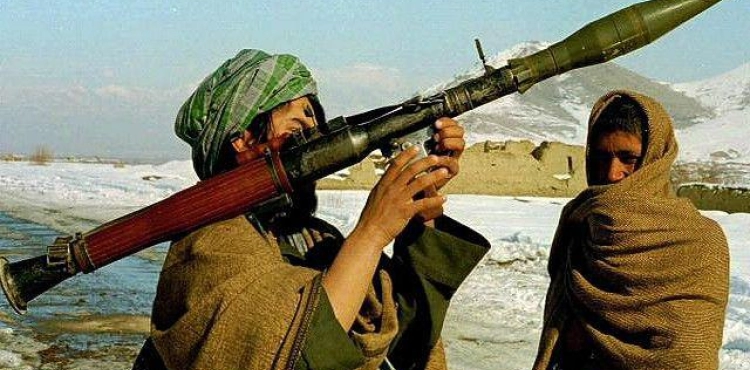International mediators in the Afghan conflict called Thursday, the Taliban movement to abandon the "Spring Offensive", during a conference in Moscow to discuss the formation of a transitional "administration" before a possible withdrawal of US forces from Afghanistan.
The meeting comes at a time when efforts are intensifying to reach a peace agreement before May 1, the date by which the United States must, in principle, withdraw all its forces from Afghanistan.
On Thursday, the Russian, American, Chinese and Pakistani mediators called on "all parties to the Afghan conflict to reduce the level of violence and the Taliban not to declare the spring offensive."
The international mediators said: "The parties must reach an agreement as soon as possible that puts an end to the war that has been going on for more than four decades in Afghanistan."
Prior to the conference, the head of the Taliban’s political office, Mullah Abdul-Ghani Baradar, called for "leaving the Afghans to decide their fate."
A spokesman for the movement stressed in a tweet, the need for the world to "take into account the Islamic values, independence and national interests of the Afghan people."
For his part, the head of the Afghan delegation, Abdullah Abdullah, head of the Supreme Council for National Reconciliation in Afghanistan, said that Kabul hopes to speed up negotiations and that "the two parties will engage in talks and discussions in an atmosphere that differs" from those that hover over the Doha talks.
For his part, the Kremlin’s envoy to Afghanistan, Zamir Kobolov, said, "A serious dialogue took place with all the Afghan parties," during which it was emphasized that "readiness to negotiate peace."
The Moscow meeting came within the framework of intensifying negotiations between the Afghan government, the Taliban and the United States to discuss the withdrawal of US forces from Afghanistan, nearly twenty years after its invasion in response to the attacks of September 11, 2001.
But US President Joe Biden spoke on Wednesday of difficulties that may prevent a full withdrawal at the scheduled date.
Russian Foreign Minister Sergey Lavrov, after receiving the delegations participating in the conference, called on Washington and the Taliban to "abide by the terms of the agreement" that the administration of former President Donald Trump signed in February 2020 with the Taliban in Qatar.
Under this agreement, the United States pledged to withdraw all its forces from Afghanistan by May 2021, in exchange for guarantees in the area of ​​security and the Taliban´s commitment to negotiate with Kabul.
On Wednesday, Biden said in an interview broadcast by the American "ABC" station: "It could happen, but it is difficult," criticizing the agreement reached by his predecessor, Donald Trump, with the rebels.
He added, "I am in the process of making a decision on the date of their departure," explaining that the announcement will be soon after consultations with Washington´s allies and the Afghan government.
Immediately after this statement, the Taliban threatened "consequences" if the United States did not withdraw its forces from Afghanistan, according to the terms of the agreement.
Taliban spokesman Zabihullah Mujahid told "Agence France Presse": "The Americans must end their occupation in accordance with the Doha Agreement and withdraw all their forces from Afghanistan by the first of next May."
He added, "If they do not do it for any reason or excuse, they will be held responsible for the consequences."
Trump adhered to the withdrawal schedule until he left the White House, and now only 2,500 American soldiers remain in Afghanistan, where Washington began its intervention after the attacks of September 11, 2001.
The talks are taking place in Moscow in the presence of Pakistani, Chinese and American envoys, in parallel with the talks that began last September, in Doha, which are now in place, and with those that Turkey will host in April / April, in Istanbul.
Lavrov expressed his regret that the efforts made to launch the political process in Doha had not yielded results yet, hoping that the talks in Moscow would help "create conditions" for progress.
He stressed that "in light of the deterioration of the military and political situation, it is unacceptable for a new delay" in the Doha negotiations.
On Wednesday, the Secretary-General of the United Nations, António Guterres, announced the appointment of the veteran French diplomat, Jean Arnault, as his personal envoy to Afghanistan and neighboring regions.
Arnault will work in coordination with Canadian Deborah Lyons, the UN special envoy to Kabul and head of the United Nations Assistance Mission in Afghanistan (UNAMA).
United Nations spokesman Stephane Dujarric said: "It has been requested from the French diplomat, who previously worked as a UN envoy to the peace process in Colombia and has experience in Afghan affairs, to help reach a political solution to the Afghan conflict."
The United States had submitted, in particular, a new peace proposal to the Kabul authorities and the Taliban movement providing for the formation of a "new inclusive government", and the Kabul authorities met with a lukewarm proposal supported by Moscow.
Washington suggested the resumption of peace talks between Kabul and the rebels "in the coming weeks" in Turkey, provided that during this period, a commitment to "reduce violence" for a period of 90 days to avoid the traditional spring offensive launched by the Taliban.
In response to this proposal, Turkish Foreign Minister Mevlut Cavusoglu confirmed that peace talks would be held in Istanbul in April, but stressed that “they will not be an alternative, but rather in support of the ongoing process in Qatar.”
The United States has also requested the United Nations to hold a meeting of foreign ministers of Afghanistan´s neighboring countries, including Iran, to discuss ensuring stability in Afghanistan in the future.
The possible withdrawal of the United States raises concern for the government in Kabul as the Taliban have intensified their attacks against Afghan forces in recent months, despite peace talks.












